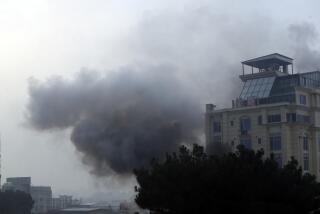A long quest for freedom ends
- Share via
After being beaten and tortured by the Sri Lankan army, Ahilan Nadarajah fled his native country in 2001.
He sought asylum in Immigration Court here and won, twice. But because of secret evidence accusing him of being a terrorist, the U.S. government kept him behind bars and then on an electronic monitor.
Seven years after his arrival, Nadarajah’s ordeal is finally coming to an end. Late last week, the U.S. attorney general declined to review the case, clearing the way for Nadarajah, 28, to receive asylum. “I’m so happy today,” he said. “I want to [give] thanks to America because they finally gave me my freedom.”
The American Civil Liberties Union of Southern California, which represented Nadarajah, announced the victory Tuesday and said he is only one of thousands of asylum seekers who have fled persecution in their countries only to be imprisoned here. In many of those cases, attorney Ahilan Arulanantham said, the government takes far too long to decide cases and often denies them based on incorrect evidence.
“Ahilan Nadarajah’s story is important beyond the personal tragedy that he suffered because it offers a window into the human costs to the mistakes -- and there are thousands of mistakes that the government has made by turning the war on terror into a war on immigrants,” said Arulanantham, the director of immigrants rights and national security at the ACLU.
The attorney general’s office, which had the case for more than two years, declined to comment.
Nadarajah, an ethnic Tamil farmer, was first arrested in Sri Lanka in 1997. The government accused him of belonging to the Liberation Tigers of Tamil Eelam, which was battling the country’s army. Nadarajah denied participation in the group, but soldiers still beat him, hung him upside down and burned him with cigarettes, according to court papers. Nadarajah was released on a bribe from his family but was rearrested. Soldiers tortured him again, holding his head inside a bag full of gasoline and beating him. Again, his family bribed authorities for his release.
After paying smugglers to help him escape, Nadarajah traveled through Thailand, South Africa, Brazil and Mexico. U.S. immigration authorities arrested him as he tried to enter the country.
In 2003, a U.S. immigration judge granted him asylum, despite the secret evidence presented by government lawyers accusing Nadarajah of belonging to the Tamil group. The government appealed, and the case was reheard, leading to a second grant of asylum. The government appealed again and in 2006, the Board of Immigration Appeals ruled in favor of Nadarajah.
Then the government took an unusual step, referring the case to the attorney general for review.
Nadarajah spent 4 1/2 years in immigration detention, including six months in isolation, as he fought his case. The ACLU sued for his release, resulting in a U.S. 9th Circuit Court of Appeals ruling saying that the lengthy detention was illegal. He was released but still had to wear an ankle monitor.
Nadarajah said he is not angry with the U.S. government but rather grateful that his name was cleared. He said he is eager to see his parents, who also fled the violence in his country and now live in India.
“I know that there are many, many people like me . . . unfairly kept in jail,” he said. “I am hoping that they will also get their freedom.”
--
More to Read
Sign up for Essential California
The most important California stories and recommendations in your inbox every morning.
You may occasionally receive promotional content from the Los Angeles Times.













